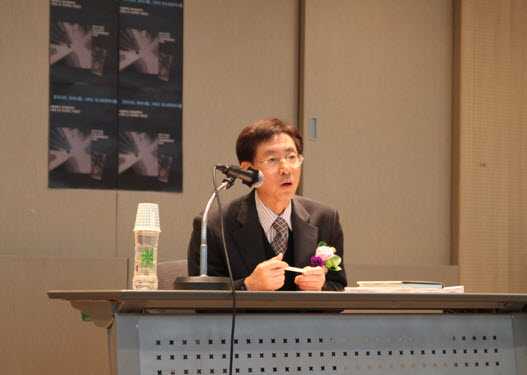
Professor SHIN Jeong-Hyun is giving his retirement lecture
Professor SHIN Jeong-Hyun (Dept. of English Language and Literature) delivered his retirement lecture titled “Modernity, Modernism, and Post-Modernism” on 28 November. Professor Shin will retire from active teaching after this fall.
Around 60 students and fellow professors gathered at the Humanities Shinyang lecture hall to hear Professor Shin’s culmination of decades-long research. Professor Shin develops a Nietzschean critique of modern society where human beings have become deprived of traditional values. Dazzled with simple pleasures of materialism, modern people have lost spontaneity and a sense of the sublime. Modernism and post-modernism constitute two different responses to this regressive modern development which has produced human alienation. In the lecture, he explored such themes focusing on Kant, Nietzsche, Hemingway, Pound, Eliot, Adorno, Lyotard, Derrida, and many others.
“I believe that post-modernism is an attitude that concentrates on how to prescribe a solution to the problematic phenomenon incurred by the calamitous ideology that men are rational beings.” Throughout his studies, he strived to explain how man could live a soulful life – to reflect back on the usable past, to restore our freedom, and “human to human” contact.
A self-proclaimed modernist, Professor Shin is one of the first scholars to bring American culture into a dialogue with Korean society. “I tried to understand the spirit laid deep in the literature and culture of American people and wanted to enrich ours by importing it into the Korean mind.” He characterizes the American spirit with the word ‘voracity,’ the mind that devours all other cultures and transforms them into an integral part of itself. He believes that such values could contribute to the cultivation of the Korean culture. As the author of The Trap of History: Understanding Korean Short Stories (1998) he made contributions to enhance the standing of Korean literature internationally.
Having taught at SNU for 28 years, Professor Shin has embodied a generation long history. “In the 1970s, we lived by the Confucian wisdom, ‘do everything by human will and then conform to the disposition of Providence’ complementing our ponderings on how we should create a plentiful and peaceful future for our people. But the introduction of nationalism in the 1980s changed the students as they began to recklessly act according to popular ideologies. Conditions have deteriorated, and now I do think this generation represents the ‘unthinking mass’ in the sense of Adorno.” He only hopes that the new generations will continue to think about what needs to be done for the people and the nation.
As much as he is a modernist, Professor Shin recalls the past wistfully. How then is he a modernist? He replies that it is not a nostalgia for the past itself, but a nostalgia for the people who lived bigger lives with more emotion, more sensitivity - people that lived the life of the Nietzschean Übermensch (superman).
Mindful of these concerns, Professor Shin educated the younger generation of the historic and traditional values in his American poetry and modern Anglo-English poetry classes. He conducted class in an authoritative way; indeed, he was a rare charismatic persona among the genteel young professors. As one of the few who still emphasized poetry reading and translation skills, he guided and pushed students to explore the limits of their intellectual capabilities.
Despite such hardships, his classes were among the most popular and the favorites of English majors. Students appreciated Professor Shin’s public scolding and corrections (often humorous to the other students) as concrete advice. His interpretations of poetry based on philosophy and history provided students with a deeper understanding of the abstruse works, not limited to, but especially of T.S. Eliot, W.B. Yeats, Emily Dickinson, Walt Whitman, and Wallace Stevens. Professor Shin is one of the last of his generation, who learned and taught literature with an emphasis on humanism and authentic values. With him, a whole tradition retires.
Professor Shin graduated from Seoul National University in 1977, took his M.A. degree there in 1979 and his Ph.D. degree at the University of Tulsa in 1986. He taught at Yeungnam University until 1987 when he came to SNU as professor of English literature.
He has published books on understanding modern Anglo-English novels and Korean literature. Major publications include “The ‘Dangerous Choices’ of Hemingway’s Characters,” “Confessional Poetry of Robert Lowell and Sylvia Plath,” “Magical Realism of Borges and Pynchon,” and “Walt Whitman’s Transcendentalist Poetry.” In 2010, he served as President to the American Studies Association of Korea.
After retirement, Professor Shin will reside in a country house at Kangwondo, enjoying the peacefulness of an idyllic life in nature, while finishing his book, The Post-Modern Spirit.
Written by BAE Su Hyen, SNU English Editor, suhyenbae@snu.ac.kr
Reviewed by Eli Park Sorensen, SNU Professor of Liberal Studies, eps7257@snu.ac.kr

